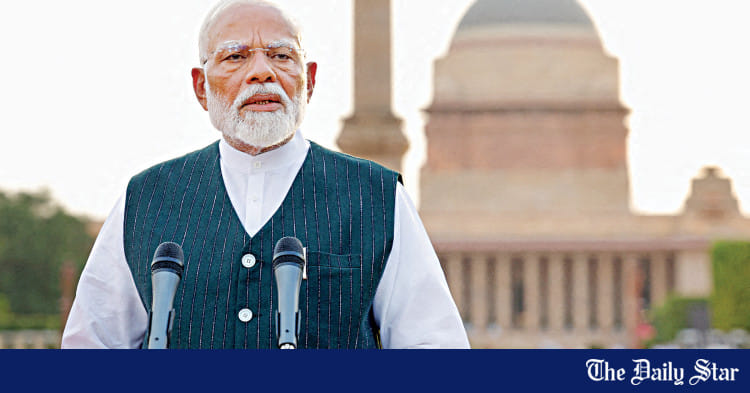Saif
Senior Member
- Joined
- Jan 24, 2024
- Messages
- 16,529
- Likes
- 8,140
- Nation

- Residence

- Axis Group


US issues rare criticism of India in religious freedom report
The United States offered rare criticism of close partner India in a report published Wednesday on religious freedom, while also voicing alarm over rising bigotry worldwide against both Jews and Muslims...
 www.newagebd.net
www.newagebd.net
US issues rare criticism of India in religious freedom report
Agence France-Presse . Washington 27 June, 2024, 23:45
The United States offered rare criticism of close partner India in a report published Wednesday on religious freedom, while also voicing alarm over rising bigotry worldwide against both Jews and Muslims.
Secretary of state Antony Blinken unveiled the annual report and said that the United States was also facing its own sharp increase of both anti-Semitism and Islamophobia in connection to the Gaza war.
'In India, we see a concerning increase in anti-conversion laws, hate speech, demolitions of homes and places of worship for members of minority faith communities,' Blinken said.
The US ambassador-at-large for international religious freedom, Rashad Hussain, faulted efforts by Indian police.
In India, 'Christian communities reported that local police aided mobs that disrupted worship services over accusations of conversion activities, or stood by while mobs attacked them and then arrested the victims on conversion charges,' he said.
The United States for decades has sought warmer ties with India, seeing the fellow democracy as a bulwark against China, with president Joe Biden embracing prime minister Narendra Modi, a Hindu nationalist who recently secured a third term.
Despite the public criticism in the report, few expect the State Department to take action on India when it drafts its annual blacklist of countries over religious freedom later this year.
The State Department also raised concerns about countries that are on the list, including India's historic rival Pakistan, where Blinken condemned blasphemy laws that 'help foster a climate of intolerance and hatred that can lead to vigilantism and mob violence.'
Blinken noted that in the United States, hate crimes against both Muslims and Jews 'have gone up dramatically.'
He also singled out EU member Hungary, led by nationalist Viktor Orban, saying that 'officials continue to use anti-Semitic tropes and anti-Muslim rhetoric and they penalize members of religious groups who criticise the government.'
He said that nine other European nations 'effectively ban some forms of religious clothing in public spaces.'
He did not name the countries, although France has been at the forefront on restricting full-face veils worn by some Muslim women.
Agence France-Presse . Washington 27 June, 2024, 23:45
The United States offered rare criticism of close partner India in a report published Wednesday on religious freedom, while also voicing alarm over rising bigotry worldwide against both Jews and Muslims.
Secretary of state Antony Blinken unveiled the annual report and said that the United States was also facing its own sharp increase of both anti-Semitism and Islamophobia in connection to the Gaza war.
'In India, we see a concerning increase in anti-conversion laws, hate speech, demolitions of homes and places of worship for members of minority faith communities,' Blinken said.
The US ambassador-at-large for international religious freedom, Rashad Hussain, faulted efforts by Indian police.
In India, 'Christian communities reported that local police aided mobs that disrupted worship services over accusations of conversion activities, or stood by while mobs attacked them and then arrested the victims on conversion charges,' he said.
The United States for decades has sought warmer ties with India, seeing the fellow democracy as a bulwark against China, with president Joe Biden embracing prime minister Narendra Modi, a Hindu nationalist who recently secured a third term.
Despite the public criticism in the report, few expect the State Department to take action on India when it drafts its annual blacklist of countries over religious freedom later this year.
The State Department also raised concerns about countries that are on the list, including India's historic rival Pakistan, where Blinken condemned blasphemy laws that 'help foster a climate of intolerance and hatred that can lead to vigilantism and mob violence.'
Blinken noted that in the United States, hate crimes against both Muslims and Jews 'have gone up dramatically.'
He also singled out EU member Hungary, led by nationalist Viktor Orban, saying that 'officials continue to use anti-Semitic tropes and anti-Muslim rhetoric and they penalize members of religious groups who criticise the government.'
He said that nine other European nations 'effectively ban some forms of religious clothing in public spaces.'
He did not name the countries, although France has been at the forefront on restricting full-face veils worn by some Muslim women.



































